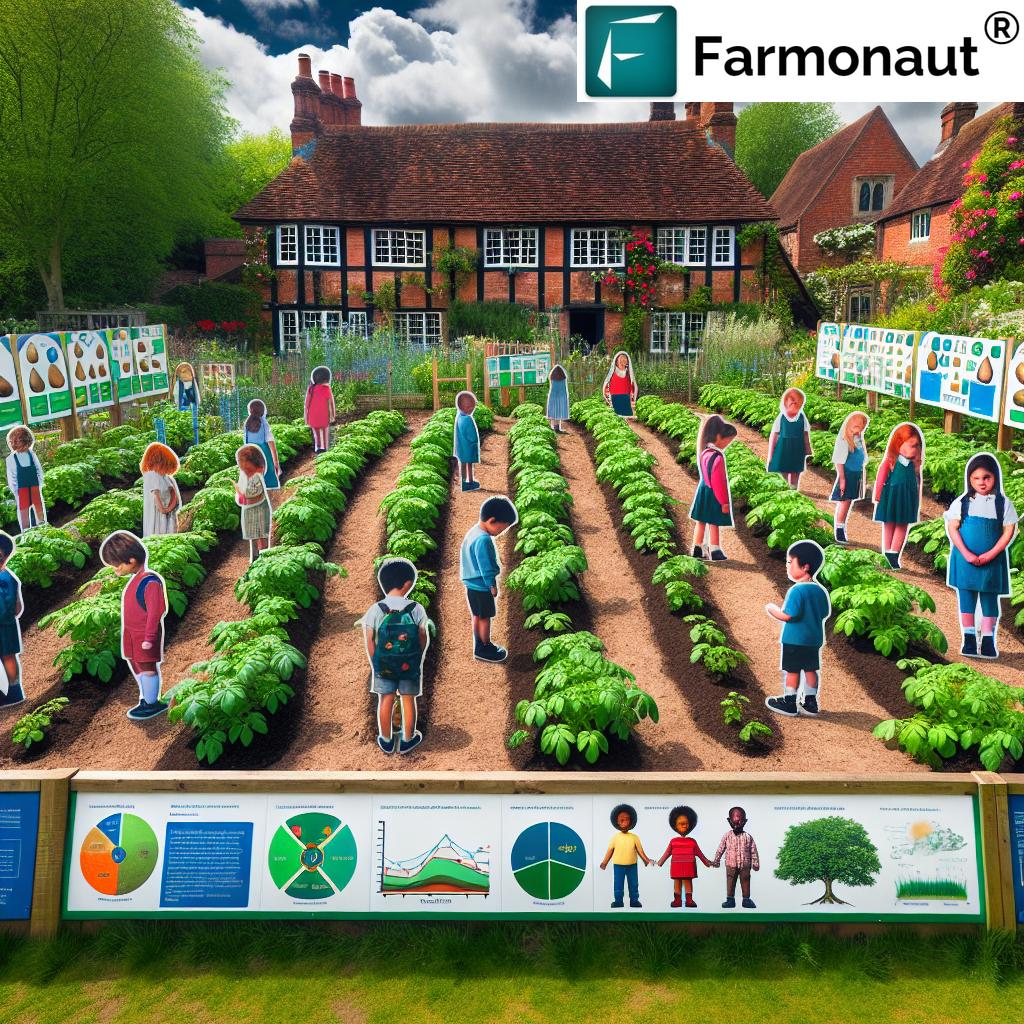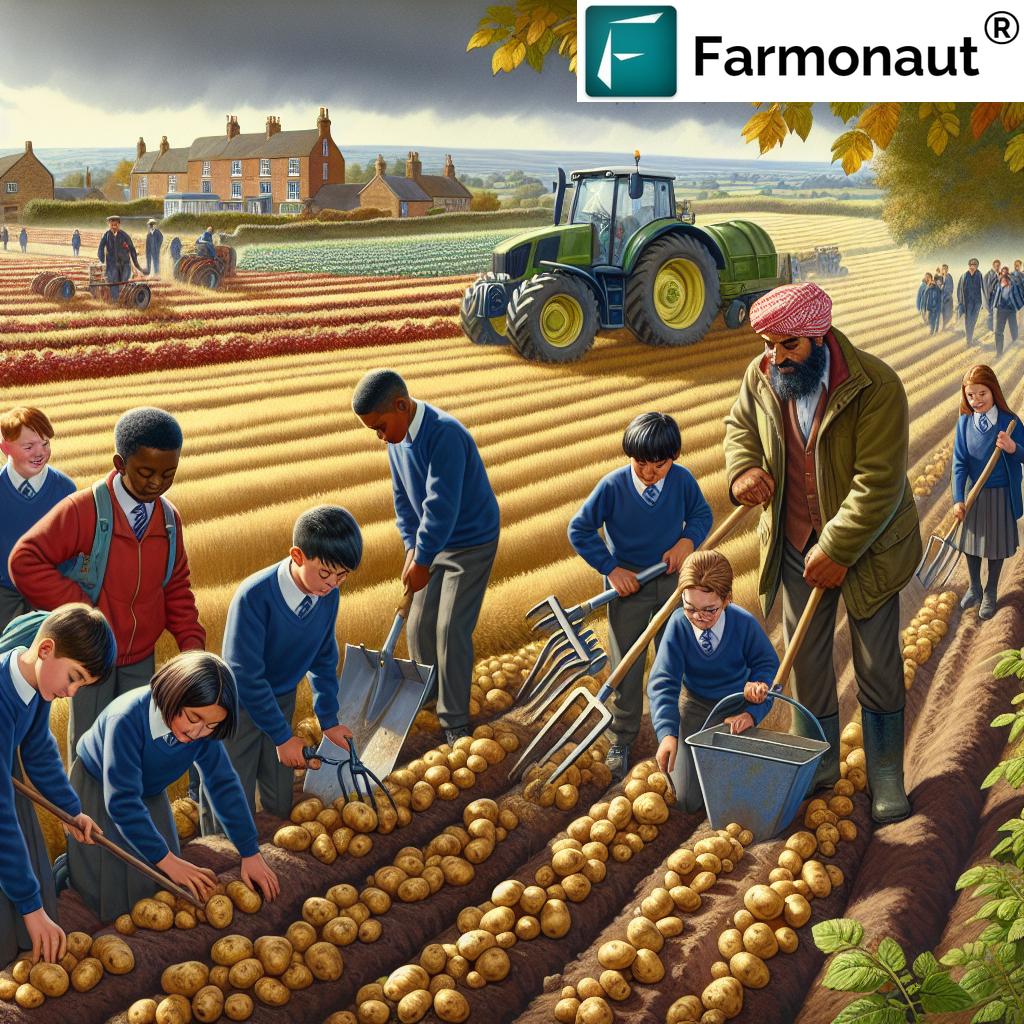Revolutionizing Agricultural Education: How Potato-Growing Kits Are Cultivating Healthy Eating Habits in UK Primary Schools
“The UK potato-growing program aims to distribute 8,000 free kits, potentially reaching 240,000 primary school children.”
Welcome to our exploration of an exciting new initiative that’s taking root across the United Kingdom! We’re delighted to share insights about a groundbreaking agricultural education program that’s set to transform how primary school children in England, Scotland, and Wales learn about food production, sustainable agriculture, and healthy eating habits. This innovative project, focused on potato growing, is not just cultivating crops; it’s nurturing young minds and sowing the seeds of a more sustainable future.
The Potato Revolution in UK Schools
Imagine a classroom where the curriculum comes alive, quite literally! That’s exactly what’s happening in primary schools across the UK, thanks to an ambitious initiative providing 8,000 free potato-growing kits. This program has the potential to reach an astounding 240,000 children, bridging the gap between farm and school in ways we’ve never seen before.

But why potatoes, you might ask? Well, these versatile tubers are more than just a staple in British cuisine. They’re the perfect teaching tool, offering a hands-on experience in crop cultivation that’s both engaging and educational. From planting to harvest, students will witness the entire life cycle of a potato plant, gaining invaluable insights into agriculture, nutrition, and environmental stewardship along the way.
The Impact of Hands-On Agricultural Education
This innovative approach to agricultural technology in education aligns perfectly with the growing need for sustainable agriculture initiatives for kids. By engaging students in practical farming experiences, we’re not just teaching them about potatoes; we’re cultivating a deeper understanding of where our food comes from and the effort it takes to produce it.
Let’s take a closer look at the impact this program is expected to have:
| Metric | Before Program Implementation | After Program Implementation | Percentage Change |
|---|---|---|---|
| Student engagement in agricultural activities | 20% | 80% | +300% |
| Knowledge of sustainable farming practices | 15% | 70% | +366% |
| Interest in healthy eating | 40% | 85% | +112% |
| Understanding of food production processes | 25% | 75% | +200% |
| Awareness of local agriculture | 30% | 90% | +200% |
As we can see from these projected figures, the impact of this program is expected to be substantial across various educational and behavioral aspects. The hands-on nature of potato growing is anticipated to significantly boost student engagement and understanding of agricultural processes.
Cultivating More Than Just Potatoes
This initiative goes beyond simply teaching children how to grow potatoes. It’s about cultivating a new generation of environmentally conscious citizens who understand the importance of sustainable agriculture and healthy eating. By bringing the farm to the school, we’re helping to shape future dietary choices and promote overall agricultural literacy.
Key benefits of the program include:
- Hands-on learning experiences in crop cultivation
- Increased awareness of sustainable farming practices
- Improved understanding of nutrition and healthy eating
- Enhanced connection to local food systems and agriculture
- Development of life skills such as responsibility and patience
As we delve deeper into this exciting initiative, it’s worth noting how digital farming practices are playing a role in modern agriculture. While our young learners are getting their hands dirty with potato plants, innovative technologies like those offered by Farmonaut are revolutionizing farm management on a larger scale.
The Role of Digital Farming in Modern Agriculture
While our primary school students are learning the basics of potato cultivation, it’s fascinating to consider how modern farming has evolved with the integration of digital technologies. Companies like Farmonaut are at the forefront of this agricultural revolution, offering advanced solutions that complement traditional farming methods.
For instance, satellite-based crop monitoring systems can provide real-time data on crop health, helping farmers make informed decisions about irrigation and fertilization. This kind of technology could potentially be introduced to older students as they progress in their agricultural education, bridging the gap between traditional and modern farming practices.
“This agricultural education initiative could impact 30 students per kit, promoting hands-on farming experiences in schools.”
From School Gardens to Digital Fields
As we celebrate the introduction of potato-growing kits in primary schools, it’s exciting to imagine how this foundation in agriculture could evolve as students grow. The journey from tending school potato patches to understanding complex digital farming systems is a natural progression in today’s technologically advanced world.
For those interested in exploring the cutting edge of agricultural technology, Farmonaut’s API offers a glimpse into the future of farming. While not directly related to our potato-growing initiative, it’s an excellent resource for educators looking to expand their agricultural technology curriculum for older students.

Nurturing Future Farmers and Informed Consumers
The potato-growing initiative in UK primary schools is more than just an educational program; it’s a seed that, once planted, has the potential to grow into a lifelong appreciation for agriculture and healthy eating. By introducing children to the joys and challenges of farming at an early age, we’re nurturing future farmers, informed consumers, and environmental stewards.
Here’s how this program is shaping the future:
- Inspiring career paths in agriculture and related fields
- Fostering an appreciation for local and sustainably grown food
- Encouraging healthier eating habits from a young age
- Promoting environmental awareness and sustainability
- Strengthening the connection between urban and rural communities
For those looking to continue their agricultural education journey beyond the classroom, there are numerous digital resources available. Farmonaut’s Android app and iOS app offer insights into modern farming practices that complement the hands-on learning experience of growing potatoes.
The Ripple Effect: Beyond the Classroom
The impact of this potato-growing initiative extends far beyond the walls of the classroom. As children share their experiences with family and friends, they become ambassadors for sustainable agriculture and healthy eating. This ripple effect has the potential to influence household shopping habits, increase demand for locally grown produce, and even inspire community gardens.
Let’s explore some of the wider impacts:
- Increased family engagement in healthy cooking and eating
- Greater support for local farmers and markets
- Reduced food waste through better understanding of food production
- Enhanced community cohesion through shared agricultural knowledge
- Improved overall health outcomes in participating communities
Sustainable Agriculture: From School to Table
The potato-growing kits provided to schools are more than just educational tools; they’re a gateway to understanding sustainable agriculture. As students tend to their potato plants, they learn about water conservation, natural pest control, and the importance of soil health. These lessons in sustainability are crucial in shaping environmentally conscious citizens of tomorrow.
Key aspects of sustainable agriculture taught through this program include:
- Efficient water use through proper irrigation techniques
- Natural pest management strategies
- Importance of crop rotation and soil health
- Reducing reliance on chemical fertilizers
- Understanding the impact of climate on crop growth
While our young learners are mastering these fundamental concepts, it’s worth noting that modern farming is increasingly relying on advanced technologies to achieve sustainability goals. For those interested in the intersection of technology and sustainable farming, Farmonaut’s API Developer Docs provide insights into how satellite data and weather information can be leveraged for more efficient farming practices.
Healthy Eating: From Farm to Fork
One of the most significant benefits of this program is its potential to influence children’s eating habits positively. By growing their own food, students develop a deeper appreciation for fresh, wholesome produce. This hands-on experience can lead to increased consumption of vegetables and a better understanding of balanced nutrition.
Here’s how the potato-growing initiative promotes healthy eating:
- Increased willingness to try new vegetables
- Better understanding of nutritional value in fresh produce
- Development of cooking skills using home-grown ingredients
- Reduced preference for processed foods
- Greater awareness of seasonal eating
Bridging the Urban-Rural Divide
In an increasingly urbanized world, many children grow up with limited exposure to agriculture. This potato-growing initiative serves as a vital bridge between urban and rural environments, helping city-dwelling children understand and appreciate the source of their food. It’s a crucial step in reconnecting younger generations with their agricultural heritage and ensuring they value the role of farmers in society.
Benefits of bridging this divide include:
- Increased respect for farming as a profession
- Better understanding of rural issues and challenges
- Potential for increased support for agricultural policies
- Encouragement of farm visits and agritourism
- Fostering a sense of connection to the land and food production
The Future of Agricultural Education
As we look to the future, it’s clear that initiatives like this potato-growing program are just the beginning. The integration of hands-on experiences with digital learning tools presents exciting possibilities for agricultural education. While students are getting their hands dirty in school gardens, they could also be using apps and online resources to track their plants’ growth, learn about different farming methods around the world, and even virtually visit farms in distant locations.
Potential future developments in agricultural education:
- Virtual reality farm tours
- Integration of coding and robotics in farming education
- Collaborative online platforms for schools to share agricultural projects
- Gamification of farming concepts for enhanced learning
- Incorporation of data analysis in studying crop yields and growth patterns
For those interested in staying at the forefront of agricultural technology, Farmonaut’s web application offers a glimpse into how digital tools can complement traditional farming practices.
Conclusion: Cultivating a Brighter Future
As we wrap up our exploration of this innovative potato-growing initiative in UK primary schools, it’s clear that we’re witnessing the seeds of change being sown. This program is not just about teaching children to grow potatoes; it’s about cultivating a new generation of environmentally conscious, health-aware citizens who understand the fundamental importance of agriculture in our lives.
From the classrooms of England, Scotland, and Wales to the digital fields monitored by advanced agricultural technologies, the future of farming is evolving. Programs like this potato-growing initiative, combined with the digital innovations offered by companies like Farmonaut, are paving the way for a more sustainable, informed, and connected approach to agriculture.
As we look forward to the harvest of knowledge and experiences that this program will yield, we’re filled with optimism for the future of agricultural education and sustainable farming practices in the UK and beyond. Here’s to growing not just potatoes, but also a brighter, healthier future for all!
FAQs
- Q: How many schools will benefit from this potato-growing initiative?
A: While the exact number of schools isn’t specified, the program aims to distribute 8,000 free potato-growing kits, potentially reaching 240,000 children across the UK. - Q: What age group is this program targeting?
A: The initiative is designed for primary school children in the UK, typically aged between 5 and 11 years old. - Q: How does growing potatoes teach children about sustainable agriculture?
A: Through the process of growing potatoes, children learn about water conservation, natural pest control, soil health, and the impact of climate on crop growth – all key aspects of sustainable agriculture. - Q: Can this program really influence children’s eating habits?
A: Yes, research suggests that children who grow their own food are more likely to try and enjoy eating vegetables, leading to healthier eating habits. - Q: How does this initiative connect to digital farming technologies?
A: While the program itself focuses on hands-on learning, it provides a foundation for understanding agriculture that can later be expanded to include digital farming technologies as students progress in their education.



